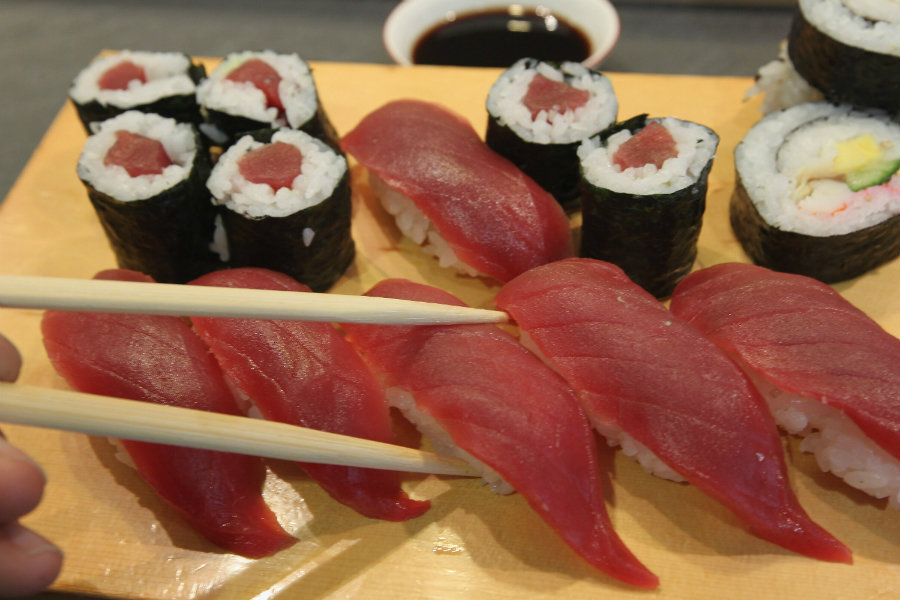After testing positive for Hepatitis A, health officials recalled imported yellowfin tuna. The Food and Drug Administration and the Centers for Disease Control and Prevention are urging people who have not been vaccinated for Hepatitis A and ate yellowfin tuna in the past two weeks -especially in California, Oklahoma, New York or Texas- should consider receiving a post-exposure prophylactic shot for the virus.
The recommendation was issued on Friday, two weeks after a recall was initiated by Hilo Fish Company Inc. of Hilo, HA.

The federal agencies said they are assisting state and local officials in assessing the risk of Hepatitis A exposure from contaminated frozen tuna sourced from Santa Cruz Seafood Inc., Philippines, and Sustainable Seafood Company, Vietnam.
Yellowfin tuna distributed by Hilo Fish tested positive for Hepatitis A
A CDC spokeswoman said that no cases of Hepatitis A had been confirmed as linked to the contaminated tuna, therefore leaving the FDA to lead the investigation.
The FDA had posted a list of entities that received the tuna, which was considered a strange move, as the agency’s standard procedure is to withhold names of retailers and such, because of a clause in federal law regarding “confidential corporate information.”
“To protect the health of consumers who may have eaten contaminated tuna and require post-exposure prophylaxis (PEP), the FDA has determined that it is necessary to make public the names of these businesses as part of the recall,” said the FDA in a statement.
Despite the announcement, the FDA did not make public the recall itself for two weeks, a critical time frame regarding exposure to the virus and the opportunity to receive post-exposure treatment.
An FDA spokeswoman announced Friday afternoon the distributor, Hilo Fish Company Inc., was responsible for notifying its customers.

“Hilo Fish Company alerted their customers and distribution partners directly to let them know about the company’s voluntary recall of certain tuna products on May 18,” said the spokeswoman, according to Food Safety News. “The FDA is working with Hilo and other distributors to ensure that the companies remove the product from the market.”
Distribution records show that the contaminated yellowfin tuna steaks and cubes were not sold directly to the public in New York. In California, Oklahoma and Texas the recalled products not only went to grocery stores and restaurants but distributors too, including Sysco, the largest foodservice supplier in the United States.
FDA issued recommendations for people who may have eaten or handled the tuna
Health officials recommend that anyone who ate the recalled tuna and developed signs of Hepatitis A infection should seek medical attention as soon as possible and tell their doctors about the possible exposure so the proper diagnostic test can be conducted.
Hepatitis A symptoms in adults include fatigue, abdominal pain, abnormal liver tests, jaundice, dark urine, and pale stool. People who become infected with Hepatitis A may not show symptoms until 15 to 50 days after consuming a contaminated food or drink.
The virus is a contagious liver disease that can range in severity. Some people experience mild symptoms that last a few weeks, while some people with higher severity can be sick for several months.
“If you are unsure if you have been vaccinated against hepatitis A virus, contact your health professional to check your immunization records,” said the FDA in its statement. “If you have been vaccinated, no further action is needed. If you are unable to determine whether you have already been vaccinated, receiving an additional dose of vaccine is not harmful.”
The FDA also issued some recommendations for retailers or restaurants that purchased the recalled tuna, such as contacting their local health department and notifying their customers about possible exposure to Hepatitis A virus.
The agency also said that if the retailer handled the recalled contaminated food, they should wash and sanitize display cases, refrigerators, cutting boards, surfaces and utensils that may have come into contact with the tuna.
Source: Food Safety News
